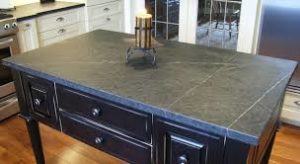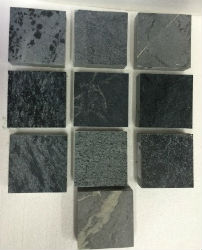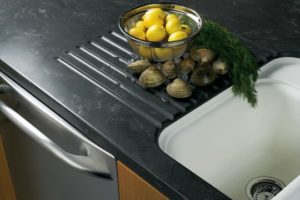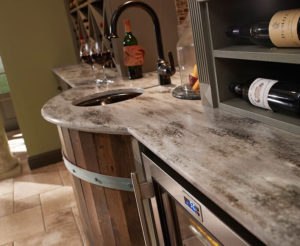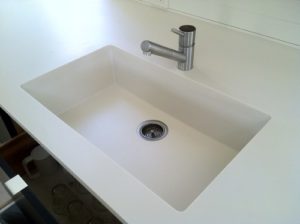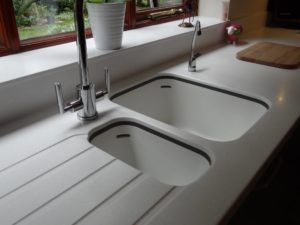Read Part 2 of this series.
Soapstone Countertops
Used in science labs due to its resistance to acids and alkalis. It’s a hard-wearing rarer material for those of you who like the unique things in life. Use it for a perfect balance between old world charm and modern functionality.
Attributes of soapstone
- A beautiful, solid stone mined in Canada, Brazil, India, Finland, and China
- Composed primarily of talc, it’s the only non-porous stone on earth. So it won’t absorb anything you throw at it.
- There are 2 kinds of soapstone. The soft kind that is easily carved and used for sculpting and the harder architectural soapstone used for countertops, sinks, tiles etc. You’ll still get that same soft velvety feel to the architectural kind.
- It’s available in 2 finishes; natural which is lighter grey, and oiled which makes the lighter grey much darker
- Completely heat resistant. After all, it’s used to line wood stoves inside and out to help hold and then radiate heat. So no worries about hot pots being placed on it
- Seams are very easy to render almost invisible as the installer can easily work the soapstone in situe
- It’s similar in hardness to marble
- If you choose to go the oiled-finish route, soapstone will require an initial treatment of mineral oil (which does require a bit of work), and then an occasional wiping with the oil thereafter. Read more about the initial treatment of oil
- It’s also a great choice for outdoor counters and sinks as it’s impervious to weather and bacteria
- Look for soapstone that is mined in Canada
Things to know about soapstone
- The color range is limited mostly to varying shades of grey. Some having blue or green undertones
- Soapstone is a soft rock and it is easily scratched in countertop use. However, a gentle sanding or treatment with mineral oil will easily remove or render shallow scratches invisible
- Make sure to read this link about the initial oiling of soapstone as it does require some work
Costs
- Around $65 per sq ft. TIP: The complexity of the job, number of seams, corners and the style of the edge profile will impact countertop costs too
- Standard eased edge is the standard profile. There are several others to choose from costing around $30-$40 extra per linear foot
- Consider fluting beside your sink. This is where the fabricator creates channels in the countertop similar to a built-in drain board
Corian Countertops
Corian is a synthetic, solid, nonporous, surface countertop material developed by Dupont in the late 1960’s. It was very popular for residential applications in the 80’s but is now most often used in commercial applications due to its repairability, hygienic qualities and ability to be molded and shaped.
Attributes of Corian
- A manmade material with a softer feel than stone
- Seamless installation means it’s possible to create a kitchen or bathroom sink set in a countertop with an attached backsplash all in one piece. Eliminating joints offer an extremely hygienic surface that doesn’t trap dirt or moisture and minimizes cleaning and maintenance
- Available in a wide spectrum of colors from white to black, in solid colors and patterns that emulate stone finishes
- This non-porous surface is anti-bacterial and resists the growth of mold and mildew
- It’s made up of 60-65% aluminum, about 30% acrylic as a binder, and the rest color
- Corian is also manufactured under other names such as Formica, Wilsonart, Swanstone and Avonite solid surface countertops
- It’s possible for home owners to remove certain stains, water marks, and fine scratches from the surface easily themselves, using a mild abrasive liquid cleanser and special sponge. TIP: In case of a more serious incident, it can usually be repaired by a professional
- Check out the 55 page Corian Design pdf magazine for inspiration
Things to know about Corian
- It’s not heat resistant, so avoid placing hot pans directly on it
- The sinks can not withstand boiling water poured directly onto them as it can damage the surface
- As with many materials, darker colors will show scratches and nicks more readily
- There are no options for finishes with Corian. It comes as a slightly shiny matte finish
Costs
- The price range is around the same as lower-end engineered stone at $85-$150 per sq. ft. TIP: The complexity of the job, number of seams, corners, and the style of the edge profile will impact countertop costs too
- Consider fluting beside your sink. This is where the fabricator creates channels in the countertop similar to a built-in drain board.
Continued in Part 4


